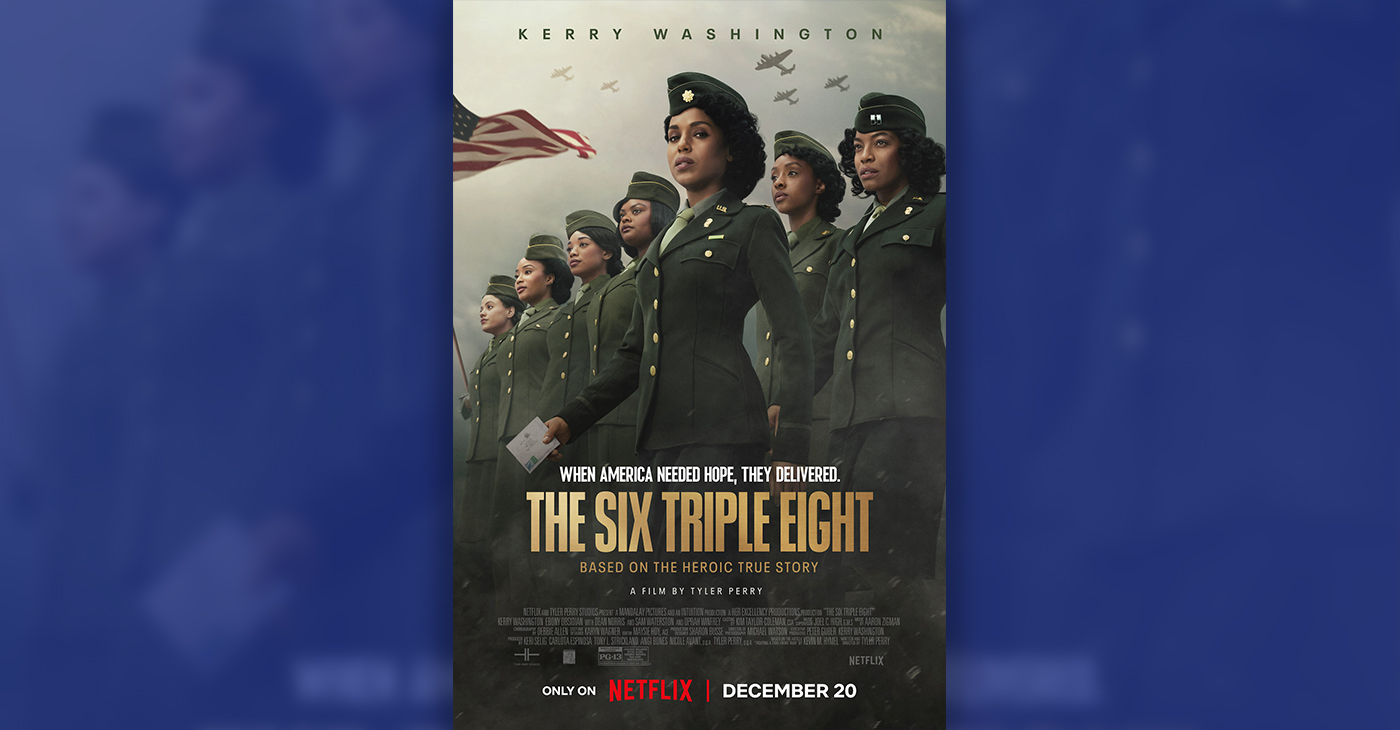Film
AFRO Exclusive: Michael Ealy Previews ‘The Intruder’
THE AFRO — When Scott (Michael Ealy) and Annie (Meagan Good) move from the city of San Francisco to the Napa Valley wine country, they are planning to begin their lives as newlyweds and start a family. Yet when the young Black couple settles in, the original owner of the house, Charlie Peck (Dennis Quaid), keeps popping up in the oddest and sometimes, scariest of ways, making for a new thriller that hits theaters May 3, “The Intruder.”
When Scott (Michael Ealy) and Annie (Meagan Good) move from the city of San Francisco to the Napa Valley wine country, they are planning to begin their lives as newlyweds and start a family. Yet when the young Black couple settles in, the original owner of the house, Charlie Peck (Dennis Quaid), keeps popping up in the oddest and sometimes, scariest of ways, making for a new thriller that hits theaters May 3, “The Intruder.”
In an exclusive interview, Michael Ealy sat down with the AFRO to share how the film manages to engage audiences with a real love story, a relatable plot and scary moments, while leaving viewers with a tough question at the end, “What would I do if this happened to me?”
“Most of the prep work from this role came in terms of working with Meagan [Good] and Deon [Taylor] the director,” Ealy told the AFRO. “We talked about trying to make this couple real. Not just this newlywed bliss fantasy. This couple has a history and we have to come to terms with what that means and whether or not it’s kind of a flaw or window of opportunity for Charlie to kind of manipulate some things and come between us.”
Through the work that Taylor, Good and Ealy put in, the romanticism, frustrations and intimate moments between Scott and Annie are believable on screen.
“We didn’t just want it to be a romanticized version of a relationship where everything is happy; everything is great. And I think we were able to get that done.”
Their relatable romance makes it that much more engaging to watch when Quaid’s character tries to mess up their new life and relationship.
“Dennis Quaid’s character, Charlie Peck, is the sociopath in this one and I’m doing everything in my power to try and protect myself and my wife from his demented way of looking at this house and us. And what he’s trying to do is tear us apart,” Ealy said.
How Quaid tries to ruin this family is what makes the plot incredibly interesting to watch.
A rare sight portrayed onscreen, the young, successful Black couple spends over $3 million on a home that had been owned by Quaid’s character’s family for generations. It is a battle between Old v. New and Black People v. The White Man, but the storyline allows for even more than just a conversation on dueling themes.
“I think where we are in 2019, it’s time to start acknowledging that we’re not a monolith, and that there are characters, there are people, who aren’t in entertainment and can afford a $3 million house. There are people who can afford a $300,000 house, and we run the full spectrum,” Ealy told the AFRO. “I think for years all we ever saw was poor Black people and that’s fine because everything had to be. Why was “Good Times” a hit? Because we had to identify with the struggle. And the reality is at this point, that not every Black child grows up with a struggle.”
“I think with regards to Scott and Annie, they’re doing well, but as you can see in the movie, it almost doesn’t matter when you come across a sociopath like Dennis Quaid’s character, Charlie.”
Ealy emphasized the identifiable common themes and storylines within “The Intruder,” that will make the film significant and enjoyable to many audiences. “I do think the film has a universal quality that can make anyone relate to it, because everyone is trying to buy home. Everyone. Most people try to buy a house at some point in their lives and your first house is where you can start a family. These are all tangible relationship goals, if you will.”
Besides the fact that audiences will see themselves reflected on screen, they will also be entertained.
“It’s a fun movie. It’ll make you laugh, it might make you cry, it might make you a little scared.”
Ealy said that seeing this film will bring feelings of nostalgia and, in the end, will have one questioning their own methods of dealing with crisis.
“This is like an old movie going experience. There’s no special effects. It’s literally a movie that’s grounded in reality. It’s like, it could be you, and I think that’s why the experience is so tangible. That’s why the experience is so fun, because ultimately you’ll see yourselves up on that screen, questioning ‘What would I do in this situation?’”
This article originally appeared in The Afro.
Arts and Culture
‘Giants Rising’ Film Screening in Marin City Library
A journey into the heart of America’s most iconic forests, “Giants Rising” tells the epic tale of the coast redwoods — the tallest and among the oldest living beings on Earth. Living links to the past, redwoods hold powers that may play a role in our future, including their ability to withstand fire and capture carbon, to offer clues about longevity, and to enhance our own well-being.

By Godfrey Lee
The film “Giants Rising” will be screened on Saturday, Jan. 11, from 3-6 p.m. at the St. Andrew Presbyterian Church, located 100 Donahue St. in Marin City.
A journey into the heart of America’s most iconic forests, “Giants Rising” tells the epic tale of the coast redwoods — the tallest and among the oldest living beings on Earth. Living links to the past, redwoods hold powers that may play a role in our future, including their ability to withstand fire and capture carbon, to offer clues about longevity, and to enhance our own well-being.
Through the voices of scientists, artists, Native communities, and others, we discover the many connections that sustain these forests and the promise of solutions that will help us all rise up to face the challenges that lay ahead.
The film’s website is www.giantsrising.com. The “Giants Rising” trailer is at https://player.vimeo.com/video/904153467. The registration link to the event is https://marinlibrary.bibliocommons.com/events/673de7abb41279410057889e
This event is sponsored by the Friends of the Marin City Library and hosted in conjunction with the Golden Gate National Recreation Area and St. Andrew Presbyterian Church.
All library events are free. For more information, contact Etienne Douglas at (415) 332-6158 or email etienne.douglas@marincounty.gov. For event-specific information, contact Zaira Sierra at zsierra@parksconservancy.org.
#NNPA BlackPress
FILM REVIEW: The Six Triple Eight: Tyler Perry Salutes WWII Black Women Soldiers
NNPA NEWSWIRE — The film features an all-star cast including Susan Sarandon as Eleanor Roosevelt, Sam Waterston as President Franklin Delano Roosevelt, Oprah Winfrey as Mary McLeod Bethune and Ebony Obsidian (Sistas, If Beale Street Could Talk)) who shows her acting chops by holding her own playing Lena, a bereaved private, opposite Washington.

By Nsenga K. Burton
NNPA Newswire Culture and Entertainment Editor

The Six Triple Eight tells the important yet often overlooked story of the 6888th Central Postal Directory Battalion, an all-Black, all-woman unit in World War II. The film chronicles the battalion’s efforts to clear a massive backlog of undelivered mail meant for U.S. troops, a task that was both vital and challenging. In a show-stopping speech atop a mountain of mail, Major Charity Adams, played fiercely by Kerry Washington, explains the importance of mail during wartime and its relationship to soldier morale. Adams, who is continuously denied promotions despite her impeccable professional performance, leads 855 Black women through 17 million pieces of mail in an abandoned, cold and drafty school rife with “vermin” to raise the morale of soldiers and bring closure to families who haven’t heard from loved ones in nearly a year.
The film features an all-star cast, including Susan Sarandon as Eleanor Roosevelt, Sam Waterston as President Franklin Delano Roosevelt, Oprah Winfrey as Mary McLeod Bethune, and Ebony Obsidian (Sistas, If Beale Street Could Talk), who shows her acting chops by holding her own playing Lena, a bereaved private, opposite Washington.
Lena is a highly sensitive and intelligent young woman who is distraught over the death of her Jewish “boyfriend,” Abram David (Gregg Sulkin), who is killed in the war. Instead of attending college, Lena enlists in the army to “fight Hitler.” En route to basic training in Georgia, Lena is joined with a group of women in the segregated battalion, all of whom are running away from a traumatic past and running towards a brighter future. What emerges is a strong sisterhood that bonds the women, whether in their barracks or crossing the big pond, which is one of the highlights of the film.
The Six Triple Eight has all of the tropes of a film set during the 1940s, including de facto segregation here and abroad, the mistreatment of Black women in and out of the service by any and everybody, aggressive white men using the N-word with the hard “R,” and older Black women whose hearts are free, but minds are shackled to fear that living in segregation and being subjected to impromptu violence, ridicule, jail or scorn brings to bear.
While the film elevates the untold story of the dynamic, pioneering, and committed Black servicewomen of the Six Triple Eight, the narrative falls prey to Perry’s signature style — heavy-handed dialogue, uneven performances and a redundant script that keeps beating viewers over the head with what many already know as opposed to what we need to know. For example, a short montage of the women working with the mail is usurped by abusive treatment from white, male leaders. A film like this would benefit more from seeing and understanding the dynamism, intelligence and dedication it took for these women to develop and implement a strategy to get this volume of mail to the soldiers and their families.
In another scene, the 6888 soldiers yell out their prior professions, which would prove helpful to keeping their assignment when they come under attack again from the white military men. Visually seeing the Black women demonstrate their talents would be far more satisfying than hearing them ticked off like a grocery list, which undermines the significance of their work and preparation for war as Black women during this harrowing time in history. The lack of emphasis on their skills and capabilities diminishes the overall impact of their story, leaving viewers wanting more depth and insight into their achievements.
While the film highlights the struggles these women faced against institutional racism and sexism, it ultimately falls short in delivering a nuanced portrayal of their significant contributions to the war effort. This is a must-see film because of the subject matter and strong performances by Washington and Obsidian, but the story’s execution makes it difficult to get through.
Tyler Perry is beloved as a filmmaker because he sometimes makes films that people need to see at a particular moment in time (For Colored Girls), resuscitates or helps to keep the careers of super accomplished actors alive (Debi Morgan, Alfre Woodward, Cicely Tyson) and gives young, talented actors like Obsidian, Taylor Polidore Williams (Beauty in Black, Snowfall, All-American HBCU) and Crystal Renee Hayslett (Zatima) a chance to play a lead role when mainstream Hollywood is taking too long. One thing Perry hasn’t done is extend that generosity of spirit to the same extent to the writing and directing categories. Debbie Allen choreographed the march scene for Six Triple Eight. What might this film have been had she directed the film?
This much-anticipated film is a love letter to Black servicewomen and a movie that audiences need to see now that would benefit immensely from stronger writing and direction. Six Triple Eight is a commendable effort to elevate an untold story, but it ultimately leaves viewers craving a more nuanced exploration of the remarkable women at its center.
Six Triple Eight is now playing on Netflix.
This review was written by media critic Nsenga K. Burton, Ph.D., editor-at-large for NNPA/Black Press USA and editor-in-chief of The Burton Wire. Follow her on IG @TheBurtonWire.
Activism
Oakland Theater Hosts Screening of ‘The Strike’ Documentary, an Incarceration Resilience Story
Over 600 people packed Grand Lake Theater in Oakland last week for a screening of ‘The Strike,’ a documentary about the longest hunger strike in U.S. history, conducted by incarcerated men living in solitary confinement. The film follows different men who are part of a generation of inmates subjected to solitary confinement for years at a time, and in some cases, decades. Many of the men were housed inside Pelican Bay State Prison, a solitary housing unit or SHU built in the 1980s, which was considered one of the toughest confinement prisons in California.

By Magaly Muñoz
Over 600 people packed Grand Lake Theater in Oakland last week for a screening of ‘The Strike,’ a documentary about the longest hunger strike in U.S. history, conducted by incarcerated men living in solitary confinement.
The film follows different men who are part of a generation of inmates subjected to solitary confinement for years at a time, and in some cases, decades. Many of the men were housed inside Pelican Bay State Prison, a solitary housing unit or SHU built in the 1980s, which was considered one of the toughest confinement prisons in California.
These men endured years with little to no human contact, aside from interactions with prison guards, during their confinement. They were stuck in an 8’ by 10’ box for 23 hours a day with only one hour of outdoor recreation in a slightly longer cell that was isolated from the outside world. Some recreation boxes didn’t even provide an open concept for inmates to get fresh air and sunlight.
In 2011, inmates went on a 19-day hunger strike to protest the living conditions inside the prison. Inmates decided to end the strike after leaders with the California Department of Corrections promised they’d make strides with changing policy. Two years later, when no significant changes had been made, inmates went on a second hunger strike, this time, for 59 days.
The documentary shows clips of policy makers and California prison leaders both defending the choices of putting inmates in solitary confinement indefinitely, and those with regret for being part of a system that further oppressed an already vulnerable group of people.
The Post spoke with a participant of the hunger strike and the directors of ‘The Strike’ after the screening.
Director Lucas Guilkey said it was a special experience being able to document the lives of the families and formerly incarcerated men who were affected by the prison system.
An up-and-coming filmmaker at the time of the first strike in 2011, Guilkey was meeting with activists, often mothers, sisters, and wives, who were finally seeing what involuntary confinement was doing to their loved ones.
“The hunger strike was in many ways folks bringing their family members back to them. Demanding to be seen as humans deserving of dignity. And it was a powerful story,” Guilkey told the Post.
Lorenzo “Dadisi” Venton, a hunger striker, spent 31 years in solitary confinement at Pelican Bay. He told the Post that it was surprising how much life outside of prison, specifically his family, could change.
Venton said his sister would send him pictures of their family but had to label who everyone was because he didn’t recognize anyone after so many years inside confinement.
“It really shocked me that I seen pictures of my brother because I hadn’t seen him in a long time. I didn’t recognize my own brother,” Venton said. “I could even look back right now and look at pictures of me when I was younger, and I don’t see me.”
When asked how he did not succumb to the loneliness of being in solitary confinement, he said he held onto hope, even when everyone else gave up.
“I felt that eventually they would have to come to the conclusion that I no longer posed a threat or potential threats to society, and age might be a factor for a lot of us who was released, [and it did] become a factor,” Venton said.
Venton shared that it’s difficult maintaining a job and having to pay bills now that he’s out of prison. He’s living paycheck to paycheck due to the lack of savings or safety net a lot of incarcerated folks lack because of the time spent behind bars.
Even with the difficulties, he said nothing will drive him to ever go back to incarceration because he has so much he wants to do with his life.
Co-director JoeBill Muñoz said that while significant changes to the California corrections system are still a long way off, the shift in policy from where it started to the present, is drastic.
Even if the film does not resonate with people personally, it’s been amazing to see how crowds have reacted to the different stories, Muñoz said.
“There’s a big central message of the film that is about unity and coming together across differences,” Muñoz said. “It’s really powerful that [the film] isn’t just limited to what happens inside prisons, but that it’s applicable in everybody’s lives here on the outside across a spectrum of different issues.”
The Strike will be available for free streaming on PBS for three months starting Feb. 3, 2025.
-

 Activism3 weeks ago
Activism3 weeks agoBooks for Ghana
-

 Arts and Culture4 weeks ago
Arts and Culture4 weeks agoPromise Marks Performs Songs of Etta James in One-Woman Show, “A Sunday Kind of Love” at the Black Repertory Theater in Berkeley
-

 Bay Area3 weeks ago
Bay Area3 weeks agoGlydways Breaking Ground on 14-Acre Demonstration Facility at Hilltop Mall
-

 Activism4 weeks ago
Activism4 weeks ago‘Donald Trump Is Not a God:’ Rep. Bennie Thompson Blasts Trump’s Call to Jail Him
-

 Activism3 weeks ago
Activism3 weeks agoLiving His Legacy: The Late Oscar Wright’s “Village” Vows to Inherit Activist’s Commitment to Education
-

 Arts and Culture3 weeks ago
Arts and Culture3 weeks agoIn ‘Affrilachia: Testimonies,’ Puts Blacks in Appalacia on the Map
-

 Alameda County3 weeks ago
Alameda County3 weeks agoAC Transit Holiday Bus Offering Free Rides Since 1963
-

 #NNPA BlackPress4 weeks ago
#NNPA BlackPress4 weeks agoCalifornia, Districts Try to Recruit and Retain Black Teachers; Advocates Say More Should Be Done





















































